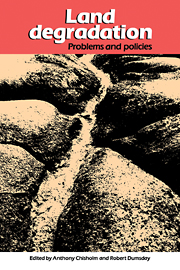Book contents
- Frontmatter
- Foreword
- Contents
- The Contributors
- Figures
- Tables
- Glossary
- Preface
- Land degradation and government
- I Physical and biological aspects of land degradation
- II Social costs
- III Legal, institutional and sociological factors
- IV Behavioural causes, economic issues and policy instruments
- V Pressure groups, public agencies and policy formulation
- VI Towards more effective policies for controlling land degradation: an overview
- A Rational approaches to environmental issues by Anthony Chisholm
- B Comments by Bruce Davidson
- C Comments by John Thomas
- D Participants at workshop on land degradation and public policy
- Bibliography
- Index
A - Rational approaches to environmental issues by Anthony Chisholm
Published online by Cambridge University Press: 05 February 2012
- Frontmatter
- Foreword
- Contents
- The Contributors
- Figures
- Tables
- Glossary
- Preface
- Land degradation and government
- I Physical and biological aspects of land degradation
- II Social costs
- III Legal, institutional and sociological factors
- IV Behavioural causes, economic issues and policy instruments
- V Pressure groups, public agencies and policy formulation
- VI Towards more effective policies for controlling land degradation: an overview
- A Rational approaches to environmental issues by Anthony Chisholm
- B Comments by Bruce Davidson
- C Comments by John Thomas
- D Participants at workshop on land degradation and public policy
- Bibliography
- Index
Summary
Preamble
In these background notes I will first attempt to highlight some of the basic assumptions and value judgments underlying economic rationality and then develop and extend some ideas in the context of the ‘benefitcost’ approach. Benefit-cost analysis is relevant to the problem of land degradation and it also provides a useful vehicle for highlighting the main aspects of rational approaches to environmental issues.
My comments focus almost exclusively on mainstream (also termed neoclassicial or rational) economics which is the approach, by and large, taken in the economics contributions to this book. Of course, not all the economists who have contributed chapters to the book would agree with the particular selection of points I choose to emphasise, or perhaps with some of the specific points I attempt to make. But I have done my best to outline a few parts of mainstream economic thinking which I think are important, together with some aspects of benefit-cost analysis.
The later part of my commentary, on benefit-cost analysis and land degradation, includes some ideas which have their origins in a paper I presented to a conference on Soil Degradation: The Future of Our Land? held in Canberra in November 1984.
Scarcity and choice
Society is endowed with a limited supply of a wide array of resources: land, skilled people, clean air, water, non-renewable resources, time, and so forth. A fundamental economic and social problem faced by society is how best to use the scarce resources.
- Type
- Chapter
- Information
- Land DegradationProblems and Policies, pp. 341 - 356Publisher: Cambridge University PressPrint publication year: 1988



